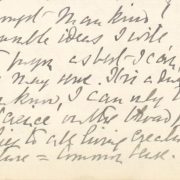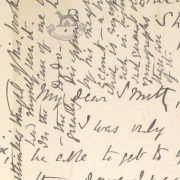3 – Letter to Smith from Richard Crawshay, Melchbourne Vicarage, Sharnbrook, Bedfordshire, 5 Nov 1907
The copyright of this material belongs to descendants of the creator. Images are permitted for reuse under a Creative Commons, Attribution, Non-commercial license.
Click here for full transcript of letter
Letter 3
[FS/3/3/3/3]
Melchbourne Vicarage,
Sharnbrook,
5/11/07
My Dear Smith,
Your kindly words in appreciation of my work are indeed helpful & reassuring coming whence they do.
I hope the remainder of the book will also please you — & I think it will.
From Quaritch yesterday I received two specimen copies beautifully bound in [illegible]: All hand work. Of these I select one for use throughout as regards that number of copies which are to be thus expensively & handsomely bound, the remainder being bound in
[[2]]
What is known as “Roxburgh”, a sufficiently pleasing & serviceable binding for practical purposes, & one suited to those libraries & book collections who substitute their non-styles for those of the author & publisher. Tomorrow, I have to be in London to discuss matters with Quaritch, & I might be in town over 2 days — hardly can one return anyhow under that time.
It would be nice to see you & show you the book but it is almost more than I may be able to achieve besides you are yourself fully occupied. As to works on Anthropology, I do not for the moment recollect anything very official beyond ‘Tylor’s “Anthropology” which I seem to remember having sent you to Pretoria.
In writing the little note I did, on the ones, I did not consult any book —
[[3]]
beyond Washington Irving (whose words I quote). & Longfellow in “Hiawatha”. What one says is just one’s own impression received.
I wonder if you know Read [sic] the keeper of anthropology at the B.M (Bloomsbury) — there is no room for this section in the N.H.M, [Natural History Museum] South Kensington –? If not, you would find him a worthy addition to your acquaintances. He is very keen on his charge.
If he is now in town I will go & see him, & ask what books he can recommend.
He was greatly pleased with an Ona arrow
If you care for one, you are most welcome I need hardly add? Indeed, long since I remember — I think — having offered or promised you one. Certainly: I agree with you up to the hilt.
[[4]]
on hygiene in clothing (& in all other ways) not only as applied to equines but to all other creatures — man included.
Aye, truly! It must prove difficult for you to stem the stream of long — established practice, no matter how based on fallacy & misunderstanding & want of common sense.
But, in the end, there can be no question but what you will prevail.
Is not common sense now telling more & more in human hygiene, although only now that nature compels? Look at the “cures” which people are ordered to undergo, involving [illegible] to the most primitive methods of life known amongst mankind!
My more humble ideas I write, with pleasure, formulate [proper?] as best I can, for any purpose these may serve. It is a duty to do so, but, as you know I can only touch on veterinary science on the broad principle of what applies to all living creatures in a state of nature = common sense. Yours most sincerely Richard Crawshay. [signature]
Please note that work on this transcript is ongoing. Users are advised to study electronic image(s) of this document where possible.


